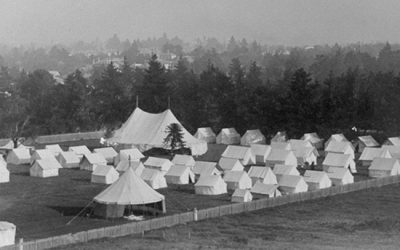The Seventh-day Adventist Church has a representative form of structure that connects its 90,000-plus congregations across the globe and gives its members a part in decision-making. Though the Church was incorporated in 1863, this system came about during the church’s reorganization from 1901 to 1903. It includes four levels of organization.
This system is unique compared to the organizational structure of other denominations.
It does not function with one person at its head (an episcopal form of organization), or even a group of leaders making decisions for the whole body (a Presbyterian form of organization). Instead, authority comes from the church members, who elect delegates to serve on the world church level.
The purpose for this kind of structure?
A denomination united with a worldwide mission needs an efficient way to carry it out. This structure ensures that every church has the resources to serve its members and lead people to Jesus.
So let’s get a little more detail by looking at:
- The four levels of organization in the Adventist Church
- The way decisions are made for the world church
- The financial structure of the Adventist Church
What are the four levels of organization in the Adventist Church Structure?

Photo by Patrick McManaman on Unsplash
Levels of organization in the Adventist Church are like concentric circles. Starting from the smallest circle in the middle, they are:
These levels link up a worldwide network of churches. Each one exists to serve the levels right below it, better enabling the local leadership to serve their individual members. In turn, the members can focus on their mission—sharing Jesus.
Local church organization
The local church is a group of believers who love Jesus and live out the teachings of His Word. They receive spiritual guidance from a pastor and come together on a regular basis for worship services. They also get to participate in the church’s decision-making process through business meetings, as needed.
All church members can attend and vote in church business meetings. The kinds of decisions made during those meetings include:
- Church membership
- Financial decisions
- Discipline
- Election of leaders
- Evangelism efforts

Photo by Vince Fleming on Unsplash
Sometimes, one function of these meetings happens on Sabbaths during the worship service. For example, after a baptism, the pastor will call for a vote to accept the baptized individual into membership—it’s simply a formal way of celebrating the new member’s acceptance into the church, showing unanimous support.
But financial and business matters, or issues that require significant discussion, are handled at other times.
In church business meetings, members have the opportunity to vote for their leaders. These leaders form the church board, which handles the administrative matters of the congregation. It’s like a board of directors for a company.
In Adventist Churches, the congregation doesn’t directly hire their pastor. Rather, the local conference provides the church with candidates to choose from and takes care of the hiring process.
Though the pastor provides spiritual support and leadership, his authority—and that of the church board—does not exceed that of the business meeting. In the end, the church members’ votes have the greatest authority.
Local conference
The local conference consists of a group of churches within a certain region, such as a state or metropolitan area. Its leaders are elected by a delegation of church members during a constituency session.
What’s a constituency session? We can compare it to the business meeting of the local church. Major decisions for the conference are made at this session.
Local churches send representatives, who have been voted by the members (or constituents), to attend the constituency session. In this way, each church takes part in the conference’s decisions.
The local conference fulfills these roles:
- Hiring of pastors
- Distribution of tithe money to pay pastors
- Authorization of local churches
- Ownership of church property
- Administration of Adventist boarding schools
- Conference-wide plans for community outreach
Union conference
A union conference is a group of local conferences within a region. It usually covers a few states, provinces, or territories.
For example, the North Pacific Union Conference in the United States covers six local conferences: Alaska, Idaho, Montana, Oregon, Washington, and Upper Columbia (the northeastern region of Washington state).
Like the local conference, the union conference holds constituency meetings. But this time, the local conference chooses the delegates from among the church members.
What is the role of the union conference?
It handles administrative matters for its region. It also ordains (authorizes) pastors and operates union institutions, such as universities.
And don’t forget evangelism! Each level of the church structure is designed to provide support in fulfilling the mission to spread the good news about Jesus.
General Conference and its divisions
The General Conference of Seventh-day Adventists, headquartered in Silver Spring, Maryland, has administration over all Adventist churches across the globe—known as the world church. It has 13 divisions with regional offices. The leaders of these divisions assist the work of the General Conference in planning and providing resources for their respective geographical areas and regions.

The divisions are:
- East-Central Africa Division(ECD)
- Euro-Asia Division(ESD)
- Inter-American Division (IAD)
- Inter-European Division (EUD)
- North American Division (NAD)
- Northern Asia-Pacific Division (NSD)
- South American Division (SAD)
- South Pacific Division (SPD)
- Southern Africa-Indian Ocean Division (SID)
- Southern Asia Division (SUD)
- Southern Asia-Pacific Division (SSD)
- Trans-European Division (TED)
- West-Central Africa Division (WAD)
You’re probably wondering what the General Conference does.
The General Conference deals with membership of union conferences, global policies, and questions related to fundamental beliefs. Delegates vote on these issues during a General Conference session every five years.
The highest decision-making authority in the Adventist Church rests in these sessions.
So, how exactly are these decisions made?
How are decisions made for the world church?

Photo by Element5 Digital on Unsplash
Delegates from around the world help make major decisions for the world church in accordance with the Bible. They come together every five years during a General Conference session that takes place in North America. This means that every church member is represented in the decisions.
Around 2,500 delegates attend the sessions and participate in voting traveling from their different parts of the world.
Of these delegates, at least half are regular church members, pastors, and teachers. Each union conference gets to select a certain number of church members as delegates.
In other words, almost any Adventist can be a delegate!
The other half are church leaders who represent institutions and committees worldwide.
During the session, the delegates discuss an agenda prepared by the General Conference executive committee and vote on the matters. They also elect General Conference leaders the conference president and world church officers.
But here’s the most important aspect:
Each stage of the decision-making process involves much prayer and Bible study.
Church leaders and delegates seek the Holy Spirit’s guidance because they realize that Jesus is their ultimate leader. They desire every decision to uphold the Bible and further the church’s mission.
What is the financial structure of the Adventist Church?
The Adventist Church operates as an official non-profit organization. All its employees and programs are supported by tithes and offerings/donations. It bases its financial structure on the New Testament church, which gathered money into a central location and distributed it to local congregations:
“And all who believed were together and had all things in common. And they were…distributing the proceeds to all, as any had need” (Acts 2:44–45, ESV).
In short, monetary support for the New Testament church came from the members.
According to the biblical model, Adventist church members return tithe—a term in the Bible that means “one-tenth.” Because God owns everything, we are stewards of His money and gladly return to Him the ten percent of our income that He asks for (Deuteronomy 14:22; Malachi 3:10–12).

Photo by Annie Spratt on Unsplash
But tithe is not used for just anything. It has a special purpose.
The tithe supports those who serve as pastors and missionaries, just like it supported the priests in the Old Testament and the church leaders in the New Testament (Numbers 18:21; 1 Corinthians 9:13–14).
Church leadership gathers the tithe and sends it to their local conferences. From there, it is distributed to pay pastors. This plan prevents the challenge of churches with many members being able to provide larger salaries than those with fewer members.
To learn more about Adventist beliefs related to tithe, check out this page on stewardship.
Then, there’s offerings.
An offering is a voluntary gift of money given to God (Exodus 35:29; 2 Corinthians 8:2–4). Sometimes, the giver assigns the offering to go toward a certain project or need.
But unassigned offerings are distributed according to the Combined Offering Plan. Here’s how it works:
About 50% of the offerings remain at the local church, 20 to 30% support regional mission, and 20% go to the General Conference, which distributes it to worldwide mission projects.

Photo by Rodolfo Clix
In this way, the world church helps each individual congregation—regardless of size or location—to accomplish its mission.
The Adventist Church’s structure is all about its mission
The Adventist denomination’s structure is unique in the way that it provides for the needs of its worldwide network and gives every member a part in vital decisions. No doubt, the Holy Spirit guided us to this plan.
This structure helps the church to function and fulfill its purpose: enabling church members to live out their mission as God’s people.
But even with all the levels of organization, we must remember one central point:
Jesus is the guide and leader of the church.
The structure is there to help us carry out His plans in the best way possible.
Related Articles
More Answers
Moviegoers’ Guide to The Hopeful: The Facts Behind the Film
Learn where and when you can watch The Hopeful and how to get tickets. Already seen it? We’ll uncover the real story that inspired this film.
How Are Seventh-day Adventists Different from Other Protestants?
As a Protestant Christian denomination, the Seventh-day Adventist Church regards the Bible as the ultimate guide and looks to Jesus Christ as the only way to salvation. We do have some differences of belief or interpretation when it comes to topics like Bible prophecy, end-time events, the Sabbath, and a person’s state after death.
How Adventists Handle Death and Funerals
Most Seventh-day Adventist funeral services are similar to those of other Protestant denominations, such as Methodists, Baptists, or Presbyterians, but you might find a few differences or unique nuances.
Do Seventh-day Adventists Believe Only They Will Go to Heaven?
No, Adventists definitely don’t believe they’re the only ones that will go to heaven. As a matter of fact, we don’t believe admittance into heaven is ever based on which church or denomination we belong to. People all over the world from different Christian denominations, religions, and walks of life will be welcomed by Jesus.
What Is Children’s Sabbath School in the Adventist Church?
Children’s Sabbath School is a Bible program offered every Sabbath at Adventist churches for children from birth to age 18. These classes give children the chance to learn Bible stories, make new friends, and participate in fun activities.
Do Adventists Observe Easter-Related Holidays?
Jesus Christ’s resurrection, celebrated on many Easter-related holidays, is central to the beliefs of the Seventh-day Adventist Church. And that means we seek every opportunity to remember it.
An Overview of Seventh-day Adventist Higher Education
The Seventh-day Adventist Church has about 118 tertiary schools around the world. Though many of them are within North America, you’ll also find Adventist universities in countries across the world—places like Croatia, Austria, Brazil, Madagascar, and the Philippines.
The Ten Commandments from a Seventh-day Adventist Perspective
Ever eaten a salad and gotten a big piece of green stuck in your teeth? And you didn’t realize it was there until you looked in the mirror? (Because no one ever told you!)
The Benefits of A Seventh-day Adventist Academy
Adventist academies are high schools (grades 9-12) that are owned and operated by the Seventh-day Adventist Church.
Are Seventh-day Adventists Christians?
Yes, the Seventh-day Adventist Church is a Protestant Christian denomination formed in 1863. Just like other Christians, we believe that Jesus Christ is our Savior and seek to follow the principles of the Word of God.
Adventist Movies: Where Faith and Film Meet
The Seventh-day Adventist Church’s mission from the beginning has been to share God’s truth in the Bible. And as times have changed, we’ve explored new ways of doing this—one of those being movies.
Do Adventists Celebrate Christmas?
In general, most Seventh-day Adventists do celebrate Christmas.
Since our denomination doesn’t have specific guidelines about holidays, it’s up to each member to decide whether to celebrate it based on their personal convictions and study of the Bible.
What Does the Bible Say About Modesty
Seventh-day Adventists and Christians in general try to ensure their outward presentation and lifestyle glorify God. This often involves daily habits like the ways we hold conversations, the ways we dress and accessorize, and the ways we regard other people when we’re out and about.
How Do Adventists Make Movie and Music Choices?
We have entertainment at our fingertips. With just a tap on our smartphones, we can access all the latest movies, music, YouTube videos, and more.
Does the Seventh-day Adventist Church Believe in Paying Tithe?
Seventh-day Adventists believe in paying tithe and offerings based on the biblical command and our commitment to being wise stewards of God’s resources. These donations help fund the mission of the Adventist Church by supporting pastors, missionaries, church expenses, and evangelistic projects, among other things.
Seventh-day Adventist World Population and Demographics
Did you know that the Seventh-day Adventist Church has more churches around the world than all the Pizza Hut, McDonald’s, and Subway restaurants combined.
What Is a Seventh-day Adventist Camp Meeting?
Although camp meetings didn’t begin with the Seventh-day Adventist Church, they’re as much an Adventist thing as haystacks.
Camp meeting is an extended event for Adventists (and non-Adventists) of all ages to gather and participate in spiritual seminars and activities. During the event, attendees often camp in tents, campers, or RVs.
How to Join the Seventh-day Adventist Church
Whether you heard about the Seventh-day Adventist Church through a traveling evangelist, during your online searches, or through a loved one or relative, you might be considering joining yourself.
How Do Adventists Do Baby Dedications?
For Christians, dedication ceremonies for babies, also for older children, are an important time for parents and the church. It’s a special part of the worship service when parents present their young children to God and the church family. Both parents, along with the congregation, regard this as a solemn promise to be a Christ-like example to the child.
Do Adventists Celebrate Communion and Foot Washing?
Like many Christian denominations, Adventists regularly participate in communion, also referred to as the “Lord’s Supper” or the “Last Supper.” They also practice foot washing (John 13:1-20), or the “ordinance of humility,” during the service—which isn’t as common.
What is the Concept of “Present Truth” and Why is it Important?
Present truth is the principle that certain biblical truths are relevant to God’s people at specific times in history. God sends the Holy Spirit to reveal truths that help us better understand how to interpret and apply His Word in a present moment.
Do Seventh-day Adventists Celebrate Easter
Yes, many Seventh-day Adventists do celebrate Easter.
Does the Adventist Church Have Youth Ministry Programs?
The Seventh-day Adventist Church has been organizing and operating youth ministry programs since 1879.
In our opinion, youth ministry is one of the most important ministries a church can have.
Do Adventists Celebrate Birthdays?
Yes, most Seventh-day Adventists do celebrate birthdays because we see them as excellent reminders of the life God has blessed us with. And we celebrate them the same way everyone else does—with friends, family, presents, and a special meal.
Sola Scriptura—What It Means and Why It Matters
Sola scriptura is a term that originated during the Protestant Reformation. It represents the way many Christians view the Bible and its authority. While the idea is simple enough, there is so much more to sola scriptura than its basic definition.
What Do Adventists Offer for Young Adults?
In recent years, the age group often classified as “young adults” has been trickier to engage. It’s been a significant concern for Christian churches around the world. Though interestingly enough, similar observations regarding young adults have been coming up in conversations about the economy, the entertainment industry, politics, and more.
Do I Need to be an Adventist to be Saved?
The answer to this question is simply, “no.”
When it comes to salvation in Jesus Christ, all that is required of a person is to acknowledge Jesus’ sacrifice for us, believe that He has saved us, and claim the free gift of salvation that is always available to us. Salvation is not based on denomination.
Do You Have to Be Vegetarian to Be Adventist?
Of course not. Membership in the Seventh-day Adventist Church has never included any dietary requirements. However, there might be some reasons people might think that. So many Adventists are vegetarians or even vegan, and a plant-based lifestyle has many health benefits.
All About Seventh-day Adventist Colporteurs
The Seventh-day Adventist Church uses a variety of methods to spread the hope of the gospel to the world. One of these ways is through colporteuring, also called “canvassing” or “literature evangelism.”
Didn’t find your answer? Ask us!
We understand your concern of having questions but not knowing who to ask—we’ve felt it ourselves. When you’re ready to learn more about Adventists, send us a question! We know a thing or two about Adventists.
































